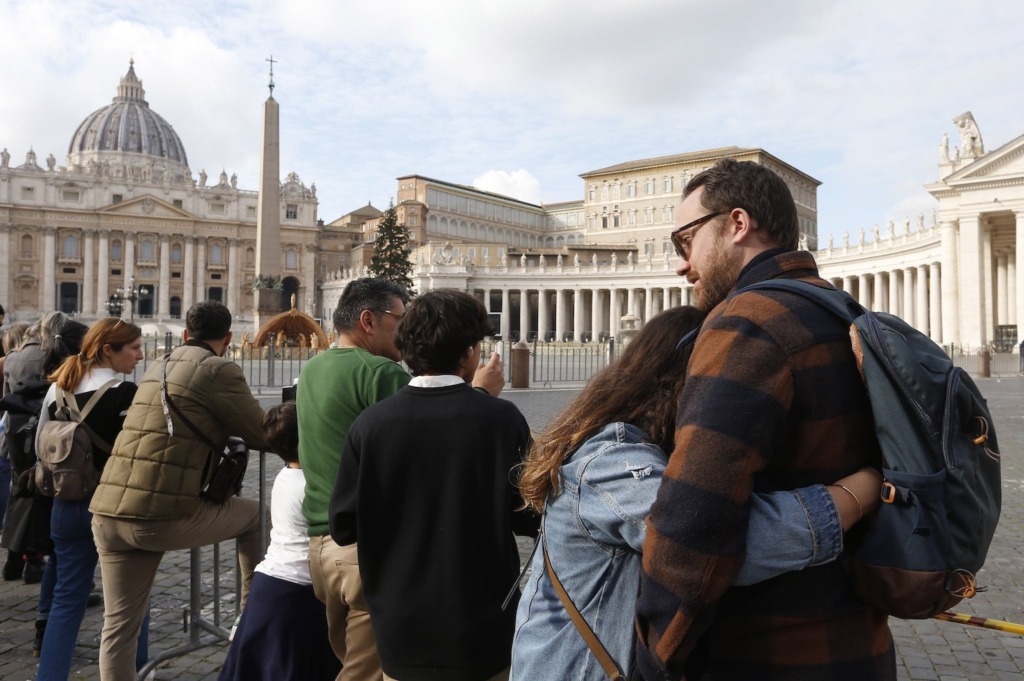VATICAN CITY – Highlighting Pope Benedict XVI’s great intellect, love and kindness, many of the world’s political and religious leaders voiced their appreciation for the late pope.
The German pope died Dec. 31 at age 95, after more than eight years as pope from 2005 to 2013 and nearly 10 years of retirement.
U.S. President Joe Biden said he and his wife “join Catholics around the world, and so many others, in mourning the passing of Pope Emeritus Benedict XVI.”
“I had the privilege of spending time with Pope Benedict at the Vatican in 2011 and will always remember his generosity and welcome as well as our meaningful conversation,” the president said.
Pope Benedict, he added, “will be remembered as a renowned theologian with a lifetime of devotion to the Church, guided by his principles and faith. As he remarked during his 2008 visit to the White House, ‘the need for global solidarity is as urgent as ever, if all people are to live in a way worthy of their dignity.’ May his focus on the ministry of charity continue to be an inspiration to us all.”
Italy’s prime minister, Giorgia Meloni, said Pope Benedict was “a man in love with the Lord. A Christian, a shepherd, a theologian: a great figure that history will not forget.”
“He was a great man of faith and reason,” who spoke and will continue to speak “to the hearts and minds of people with the spiritual, cultural and intellectual profoundness of his teachings,” she wrote.
Italy’s President Sergio Mattarella said the pope’s death is a time of mourning for all of Italy.
“His kindness and wisdom benefited our community and the entire international community,” and even in his retirement, the president said, he continued to serve the Church “with humility and serenity.”
French President Emmanuel Macron tweeted, saying his “thoughts go out to Catholics in France and around the world.” The retired pope “worked with all his soul and intelligence for a more fraternal world.”
British Prime Minister Rishi Sunak, tweeted, “He was a great theologian whose UK visit in 2010 was an historic moment for both Catholics and non-Catholics throughout our country. My thoughts are with Catholic people in the UK and around the world today.”
German Chancellor Olaf Scholz tweeted that Pope Benedict was “a special Church leader for many, not only this country.”
German President Frank-Walter Steinmeier highlighted the pope’s dedication to ecumenical and interreligious dialogue, seeking dialogue “with Jews and Muslims as well as all Christian denominations worldwide.” He also understood “the great suffering of the victims (of sex abuse) and the immense damage to the credibility of the Church,” he added.
Ronald S. Lauder, president of the World Jewish Congress, said, “No pope before him visited as many synagogues, and he made a point of meeting with local Jewish community representatives whenever he visited foreign nations.”
As pope and cardinal, he gave “the Catholic-Jewish relationship solid theological underpinning and enhanced understanding,” Lauder said, adding that he was “deeply moved” by the late pope’s “affection and friendship for the Jewish people, his commitment to remembrance of the Shoah and his unambiguous condemnation of Holocaust denial in any form.”
Abu Bakr Moretta, president of the Italian Islamic Religious Community, offered the condolences of Muslims in Italy in a message recalling the late pope’s visit to the Blue Mosque in Istanbul, Turkey, in 2006, and his various meetings with Muslim heads of state and theologians.
“We recall his theological stature, which during the years of his pontificate provided the occasion for an intellectual debate between Christians and the Islamic world,” Moretta wrote in a statement Dec. 31.
He quoted Pope Benedict as telling the Catholic-Islamic Forum in 2009: “I am aware that Muslims and Christians have different approaches to questions concerning God, however, we can and must be worshippers of the one God who created us and who cares for every person in every corner of the earth.”
Anglican Archbishop Justin Welby of Canterbury said, “Pope Benedict was one of the greatest theologians of his age – committed to the faith of the Church and stalwart in its defense,” showing clearly “that Christ was the root of his thought and the basis of his prayer.”
Pope Benedict XVI has left a legacy of ecumenical dialogue, the World Council of Churches said. Its acting general secretary Rev. Ioan Sauca said that “within a short time of Benedict becoming pope, long-standing grievances that had prevented meetings of the Catholic-Orthodox dialogue commission were swept aside.”
“The commission had drawn up the ‘Ravenna Declaration’ as a first step toward overcoming the thousand-year disagreement on the role of the papacy,” he said, and the late pope “demonstrated courage as much in his leadership, his writings and his pronouncements.”

